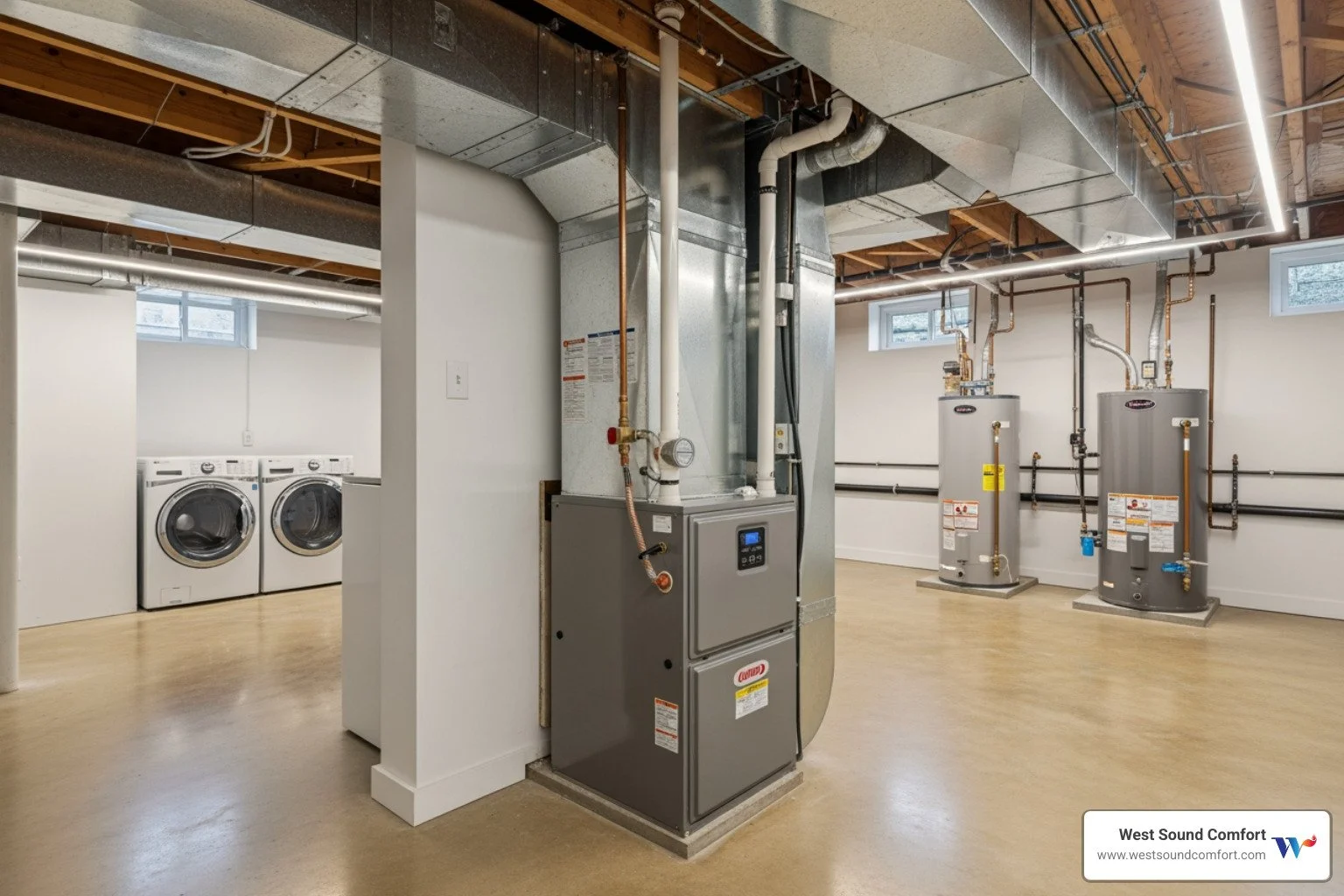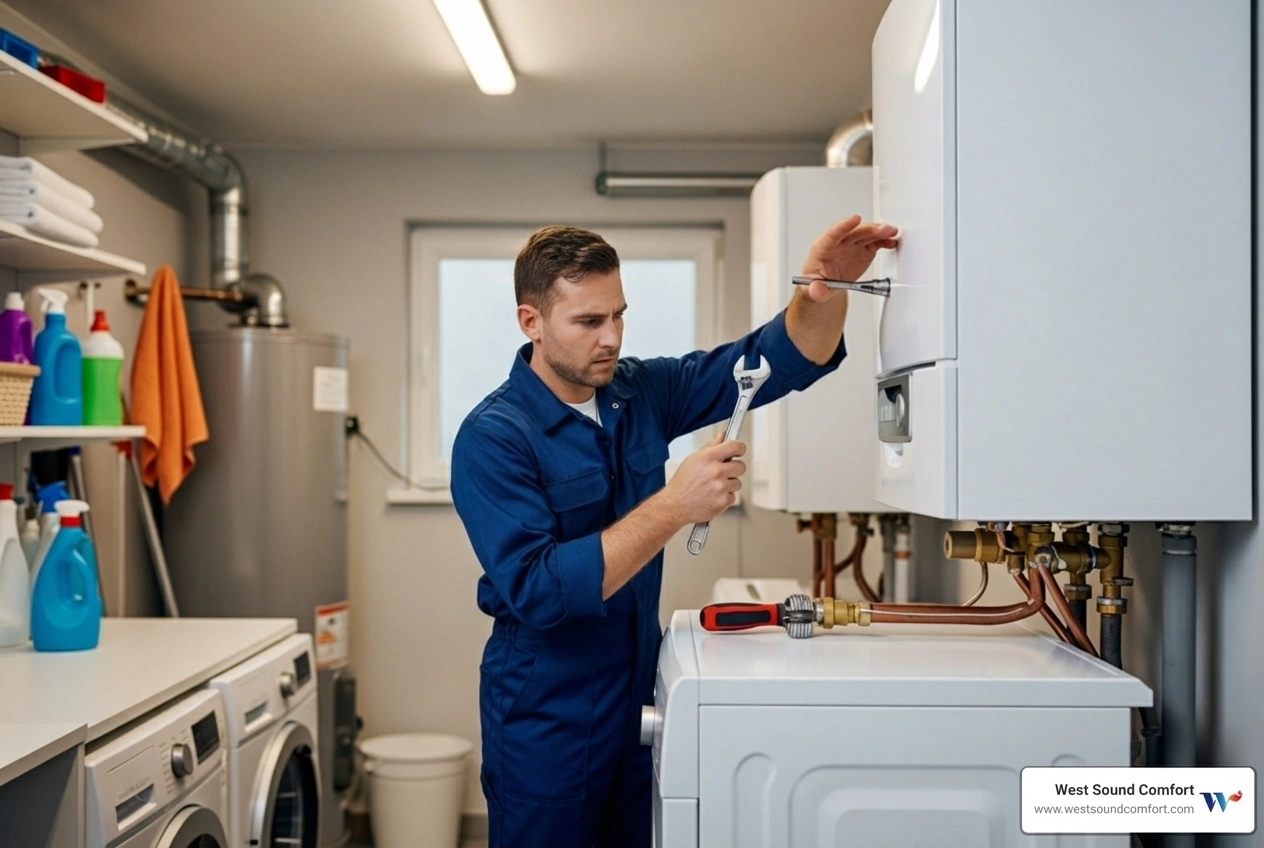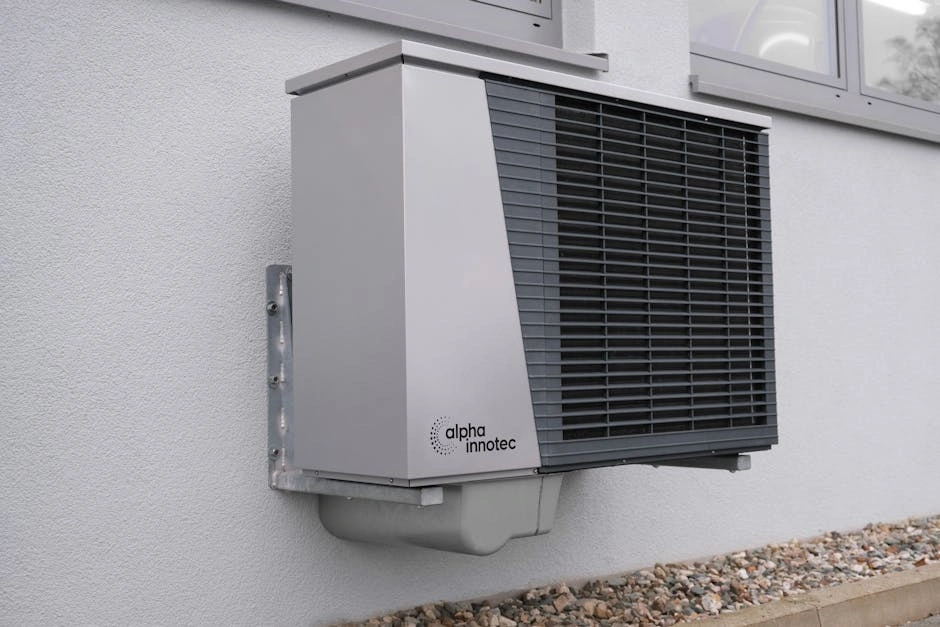Why Your Furnace Blowing Cold Air Matters in Bainbridge Island
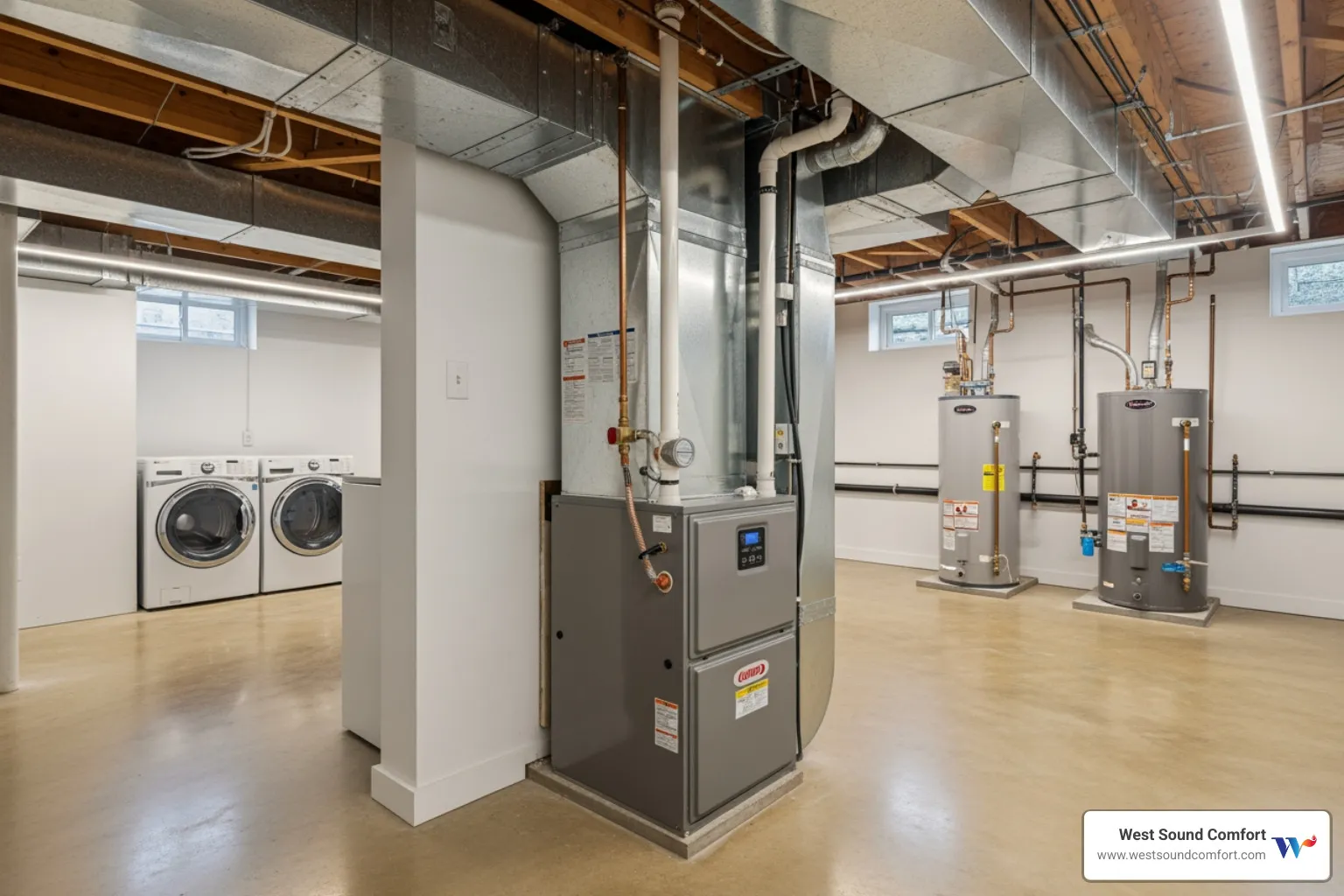
When your furnace is blowing cold air in Bainbridge Island, WA, it's more than just uncomfortable—it's a problem that needs quick attention. You expect warmth, but cold air flows from your vents instead. This issue is common in Pacific Northwest homes, especially during our damp, chilly winters.
Quick Answer: Top 4 Reasons Your Furnace Blows Cold Air
- Thermostat Setting - The fan is set to "ON" instead of "AUTO," causing it to run continuously even when not heating.
- Dirty Air Filter - Restricted airflow causes the furnace to overheat, triggering safety shutoffs that lead to cool air blowing.
- Pilot Light or Ignition Issues - Gas furnaces can't produce heat if the pilot light is out or the ignitor fails.
- Leaky Ductwork - Heated air escapes into attics or crawl spaces before reaching your rooms.
The good news is that some fixes are simple DIY tasks, while others require professional help for safety and to prevent system damage. Knowing the difference can save you time, money, and discomfort.
If you're experiencing other HVAC issues, explore our full range of HVAC Services, or if you need immediate assistance, request a quote to get your system warming your home properly.
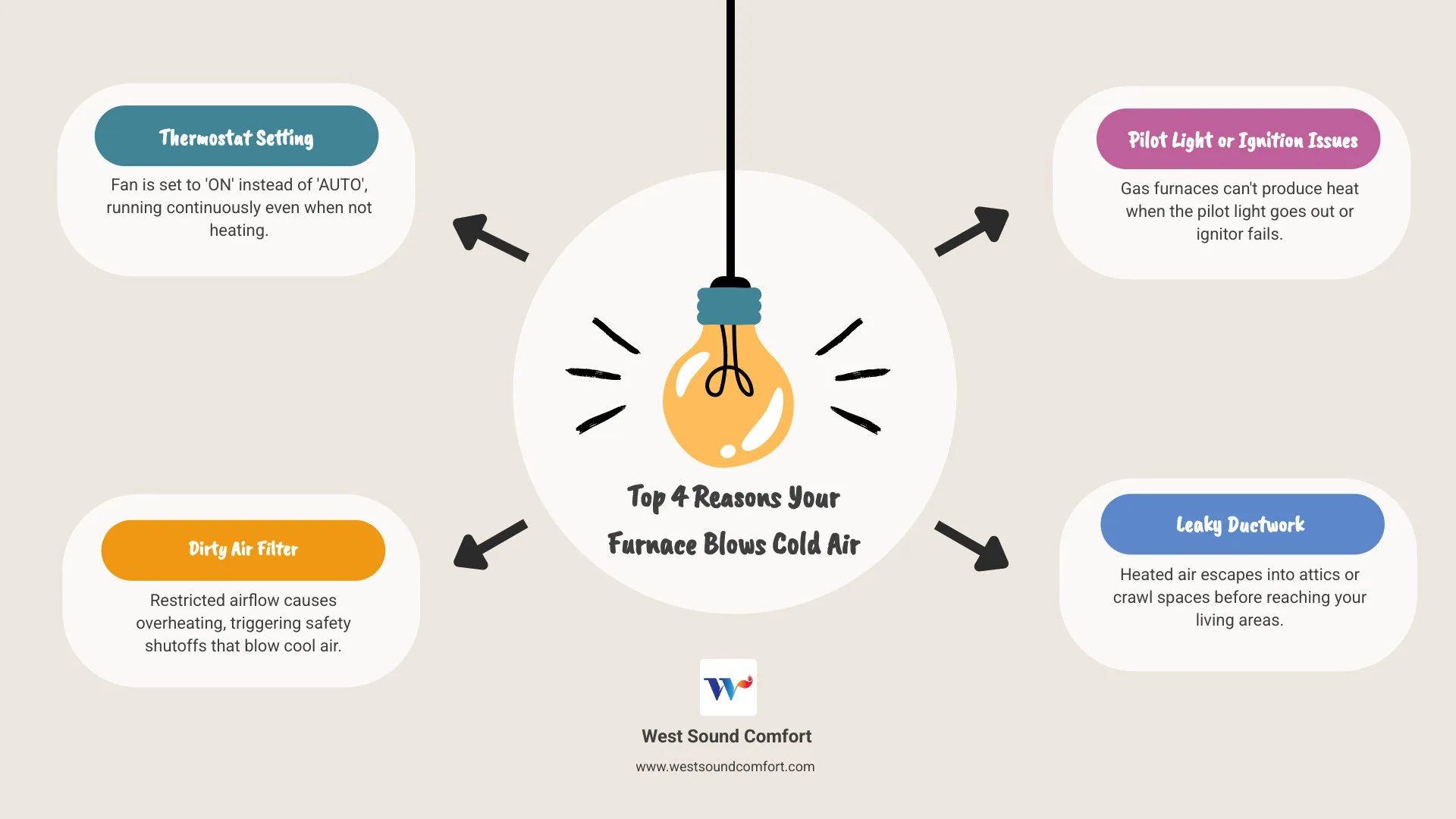
Simple DIY Checks Before You Call for Help
If your furnace is blowing cold air in Bainbridge Island, WA, don't panic. Many common causes have simple DIY solutions that can get your heat running again in minutes without a service call. Let's walk through these quick, safe checks.
How to Troubleshoot a Furnace Blowing Cold Air
Start with the easiest culprit: your thermostat. It sounds simple, but it's a frequent cause.
Check the fan setting. If it's on "ON" instead of "AUTO," the blower motor runs constantly, even when the furnace isn't heating. This pushes cool air through your vents between heating cycles, making your home feel chilly.
The fix is simple: switch the fan to "AUTO." The fan will then only run when the furnace is heating, and you should feel warm air shortly.
If you're still having trouble after checking your thermostat settings, our team can help. Learn more about our comprehensive HVAC Services throughout Kitsap County.

The Role of the Air Filter
Next, check the air filter. A dirty air filter is one of the most common reasons a furnace blows cold air.
When the filter clogs with dust and debris, it restricts airflow. Without enough air, the heat exchanger can get too hot. A safety control switch then shuts down the burners to prevent damage, but the fan keeps running, pushing unheated air through your vents. The furnace is protecting itself from overheating, but you're left in the cold.
The solution is to check your filter. If it's gray or clogged, replace it. We recommend changing filters every 1-3 months, depending on your household. A clean filter improves furnace efficiency, lowers energy bills, and improves air quality.
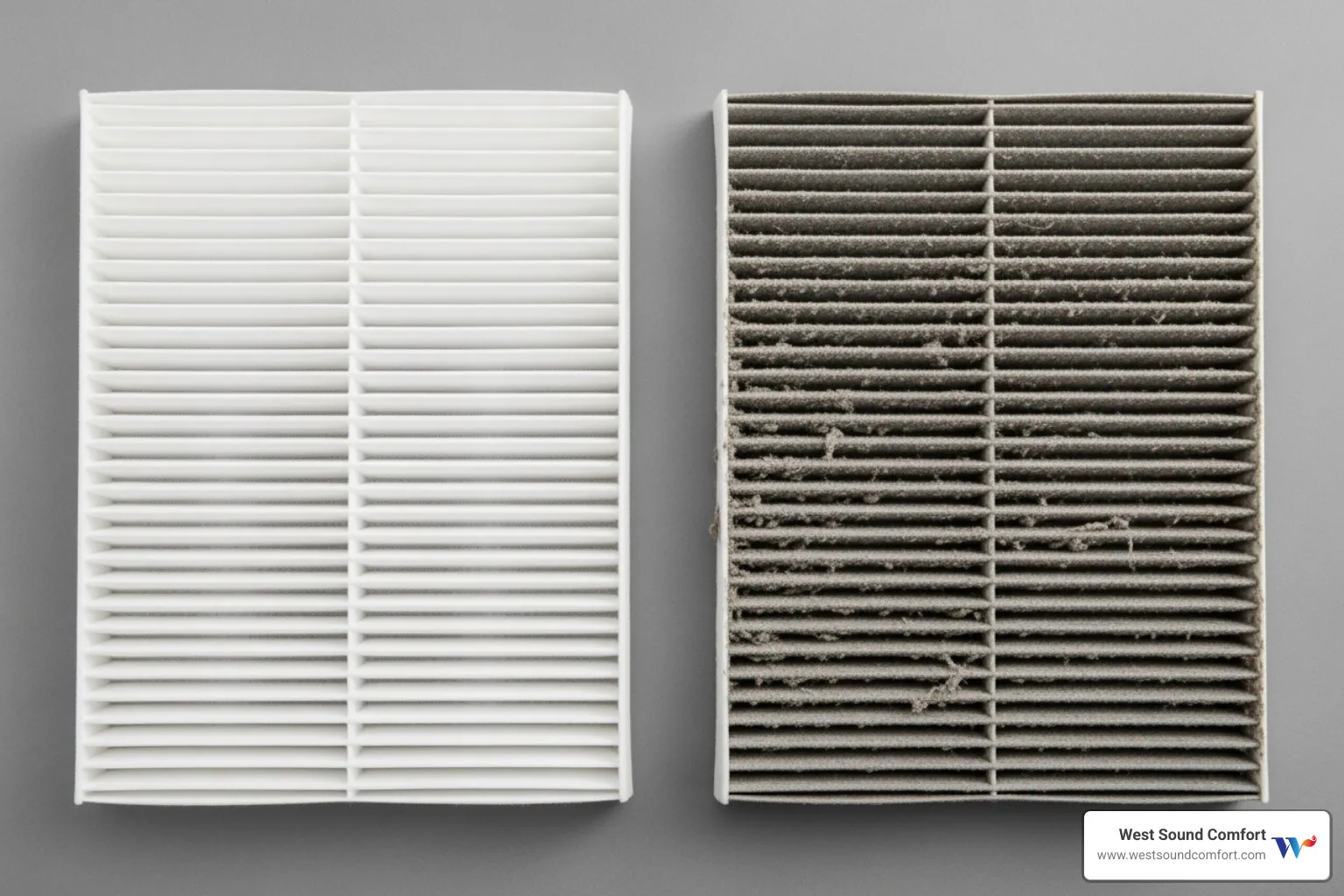
How to 'Reboot' a Modern Furnace
Modern furnaces have an electronic control board that can sometimes develop glitches, much like a computer. A simple restart can often fix the issue.
If the thermostat and filter are fine, try a system reset. Locate the furnace power switch (usually on or near the unit) and turn it off. Wait a minute, then turn it back on. This can clear temporary errors.
Also, check your home's circuit breaker panel. Find the furnace breaker and ensure it's on. If it has tripped, flip it completely off, then back on. This reboot often resolves minor electronic issues. If warm air starts blowing, the problem is solved!
Checking the Pilot Light on Older Furnaces
Older gas furnaces use a pilot light to ignite the main burners. If this small flame goes out, the furnace can't produce heat and will blow cold air.
Checking the pilot light is straightforward, but always follow the relighting instructions on your furnace or in its manual for safety. Typically, this involves turning the gas valve to "Pilot," waiting for gas to clear, and then relighting the flame while holding a reset button. Holding the button heats the thermocouple, a safety device. Once the flame stays lit on its own, turn the valve to "On."
If the pilot light won't stay lit or you smell gas, stop immediately and call for professional help. A persistent issue could indicate a faulty thermocouple or other problem, and smelling gas is an emergency. Safety precautions are paramount.
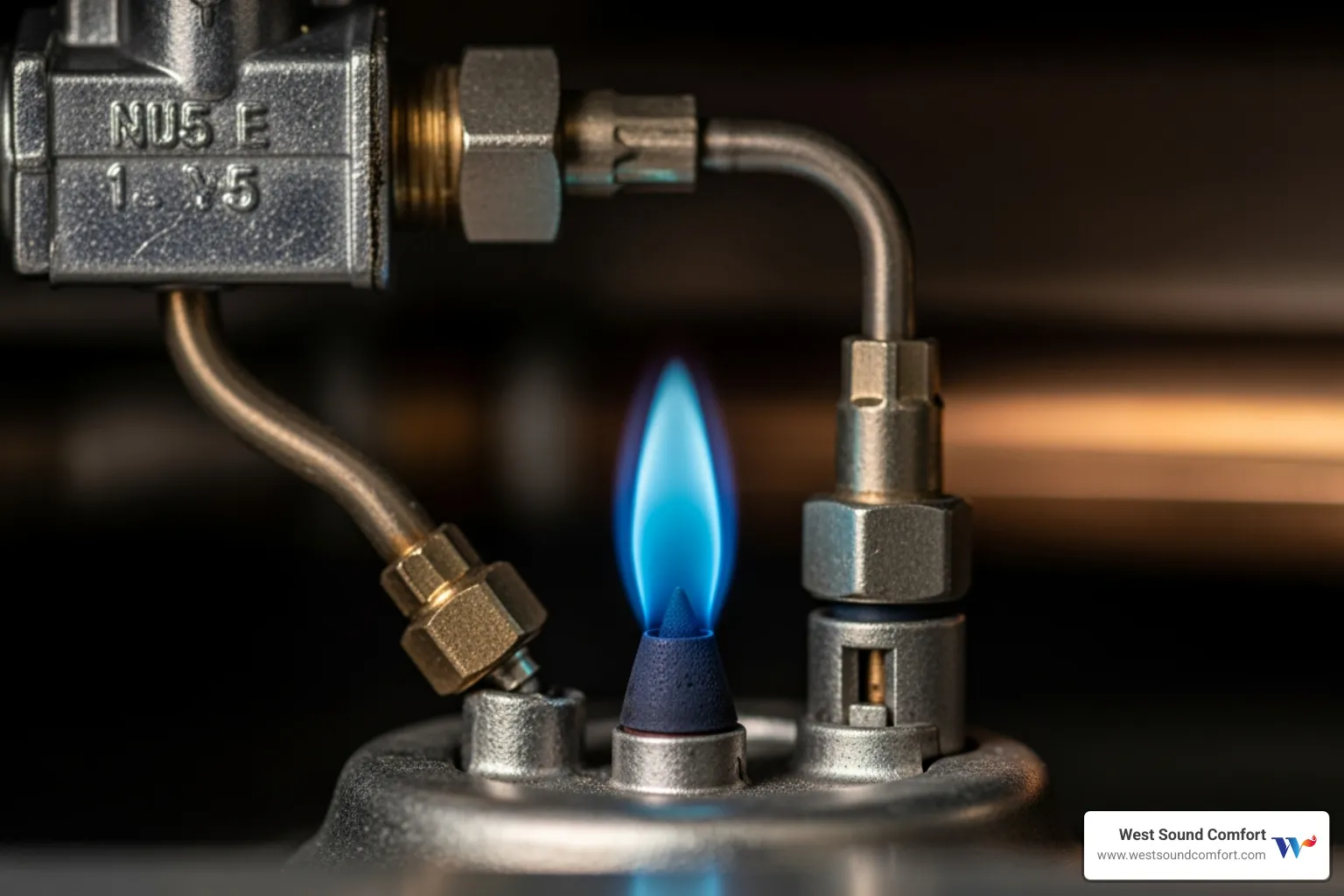
Why Is My Furnace Blowing Cold Air in Bainbridge Island, WA?: Deeper Diagnostics
If the simple DIY checks didn't work, the problem is likely more complex and requires a professional. These issues often involve the furnace's internal components and need an expert to diagnose and repair safely.
Dirty Flame Sensor or Faulty Ignitor
Modern gas furnaces need a working ignitor and flame sensor to create heat. If either fails, the furnace won't work correctly.
The ignitor creates a spark or hot surface to light the gas. If it fails, the furnace may sound like it's starting, but the gas won't ignite, and it will blow cold air.
The flame sensor is a safety device that confirms a flame is present. If it gets dirty with soot buildup, it can't detect the flame and will shut off the gas valve. The furnace will then blow cold air and may cycle on and off repeatedly.
Repairing or replacing these safety components requires specialized knowledge and should be handled by an HVAC professional.
Clogged Condensate Line
High-efficiency furnaces create condensation as a byproduct of heating. This water must be removed through a drain line. Over time, this line can become clogged with algae or debris, causing water to back up into the furnace.
A water safety switch detects the backup and triggers a furnace shutdown to prevent water damage. The furnace stops heating, leaving you with cold air and a potential puddle. While minor clogs can sometimes be cleared by homeowners, a severe blockage requires professional help to prevent water damage. For more insights on maintaining your home's comfort systems, check out The Comfort Zone.
Leaky Ductwork in the Pacific Northwest Climate
Your furnace might be working perfectly, but leaky ductwork can cause that warm air to escape into your attic or crawl space before it reaches your rooms. When duct connections loosen or seals fail, heated air leaks into unheated spaces. The system may also pull in cold air from these areas, making the air from your vents feel cool.
In the PNW's moist climate, duct deterioration can accelerate. Leaky ducts mean you're paying to heat your attic instead of your home, leading to higher energy bills. The impacts include high energy bills, uneven heating, increased furnace wear, and poor indoor air quality as dust and allergens are pulled from unconditioned spaces.
Air pressure imbalances reduce efficiency. If you suspect your furnace blowing cold air in bainbridge island, wa is due to duct problems, a professional inspection is needed to identify and seal leaks. Similar HVAC challenges affect homes throughout our region—you can read about related issues in our article on HVAC Broken in Gig Harbor, WA.

When to Call a Professional for Furnace Repair
Knowing when to stop DIY troubleshooting and call a professional is crucial for your safety, your system's lifespan, and your home's comfort.
Signs Your Furnace Needs Professional Attention
Recognizing these warning signs can save you from bigger headaches. Call a professional if you notice any of them, as ignoring them can lead to expensive repairs or safety hazards.
- Unusual noises: Banging, whistling, or screeching can indicate loose parts or a failing motor. A healthy furnace should be quiet.
- Strange smells: A brief dusty smell at the start of the season is normal. However, a persistent electrical or metallic smell suggests overheating. A rotten egg smell indicates a gas leak—evacuate immediately and call for emergency help. For guidance on urgent situations, check out our information on Emergency HVAC Repair in Manchester, WA.
- Frequent cycling: If your furnace turns on and off too quickly (short cycling) or runs constantly, it's a sign of a problem like a faulty thermostat or failing component.
- Yellow pilot light: A healthy pilot light is blue. A yellow or orange flame indicates incomplete combustion and a potential carbon monoxide risk. This is a serious safety hazard requiring immediate inspection.
- Visible rust or cracks: Cracks in the heat exchanger are especially critical, as they can leak carbon monoxide into your home.
- Uneven heating: Some rooms being cold while others are warm can point to ductwork problems or a struggling furnace.
- Higher energy bills: A sudden spike in your bills without a change in habits often means your furnace is running inefficiently.
The Benefits of Regular Furnace Maintenance
Waiting for your furnace to break is the most expensive approach. Regular maintenance is preventative care and the best way to avoid a furnace blowing cold air in bainbridge island, wa during a cold snap.
An annual inspection is like an oil change for your car. A technician will clean, lubricate, and inspect components, catching small problems before they become emergencies. This has several key benefits:
- System longevity: A well-maintained furnace can last 15-20 years, while a neglected one may fail much sooner.
- Energy efficiency: A tune-up helps your furnace run at peak efficiency, lowering your heating bills.
- Warranty protection: Many manufacturers require proof of annual maintenance to keep your warranty valid.
- Safety: Most importantly, technicians inspect for cracks, worn parts, and other issues, ensuring safe operation and reducing the risk of carbon monoxide exposure.
When to Call a Pro for Furnace Blowing Cold Air in Bainbridge Island, WA
If you've tried all the DIY steps and your furnace still blows cold air, it's time to call West Sound Comfort. Here’s when to make the call:
- DIY steps have failed: This is a clear sign the problem is more complex.
- Persistent issues: If the problem keeps coming back, it points to an underlying issue that needs an expert.
- Safety concerns: If you smell gas, see a yellow pilot light, or spot cracks on your furnace, stop and call for help immediately. These are potential emergencies.
- Complex diagnostics: Issues like a faulty flame sensor, clogged condensate line, or leaky ductwork require professional tools and experience to diagnose correctly.
- You're uncomfortable: If you're not comfortable with any DIY step, it's always best to call a professional for peace of mind.
With over 30 years of experience serving Bainbridge Island and Kitsap County, our technicians have the expertise to solve any furnace problem. We arrive with the right tools and parts to get your heat running again. Don't spend another cold night wondering what's wrong—request a quote today to restore warmth to your home.
Frequently Asked Questions about Cold Furnaces
When your furnace blows cold air, you'll have questions. Here are answers to some of the most common concerns we hear from Bainbridge Island homeowners.
Could a dirty air filter really cause my furnace to overheat and blow cold air?
Yes, absolutely. It's one of the most common causes we see. A dirty filter restricts airflow, causing the heat exchanger to overheat. A safety device called the high-limit switch then shuts down the burners to prevent damage. The fan continues to run, but since the burners are off, it blows cool air.
The furnace is protecting itself. The solution is to replace your air filter regularly (every 1-3 months) to prevent overheating and keep your system running efficiently.
What are the risks associated with a furnace blowing cold air?
Besides discomfort, a furnace blowing cold air in bainbridge island, wa can signal risks to your safety, finances, and home.
- Increased energy costs: A malfunctioning furnace wastes energy, driving up utility bills. Leaky ductwork is especially costly, as you're paying to heat your attic or crawl space.
- System damage: The extra strain on a malfunctioning furnace shortens its lifespan and can lead to expensive repairs or premature replacement.
- Frozen pipes: In our Pacific Northwest winters, if your home gets too cold, pipes can freeze and burst, causing extensive water damage.
- Potential safety hazards: Some issues, like a cracked heat exchanger or gas leak, pose serious safety risks, including carbon monoxide exposure. A rotten egg smell indicates a gas leak and requires immediate evacuation and a call for help.
A furnace blowing cold air is a warning sign that needs attention to protect your home and family.
What information should I provide to an HVAC technician?
When you call for service, providing the right information helps our technicians diagnose the problem faster. Be ready to share:
- Furnace make and model: Usually found on a sticker inside the access panel.
- Age of the system: This helps us understand potential wear-and-tear issues.
- Specific symptoms: Describe the problem in detail (e.g., constant cold air vs. starts warm then turns cold, strange noises or smells, when it started).
- Troubleshooting steps you've taken: Tell us if you've already checked the filter, thermostat, or circuit breaker.
- Recent events: Mention any recent power outages or home improvement projects.
- Thermostat behavior: Note the settings and if it's responding correctly.
Having this information ready when you Book Now helps our technicians work more efficiently. For immediate help, request a quote.
Conclusion: Restoring Warmth to Your Bainbridge Island Home
Feeling a blast of cold air from your vents is alarming, but you're now equipped to troubleshoot many common causes of a furnace blowing cold air in bainbridge island, wa. We've covered the simple DIY fixes: checking the thermostat, replacing the air filter, and rebooting the system. These steps often restore heat quickly.
However, some issues like a faulty flame sensor, clogged condensate line, or leaky ductwork require a professional. For your family's safety and comfort, it's best not to guess when dealing with complex repairs or potential hazards like carbon monoxide.
The best way to avoid these surprises is proactive maintenance. An annual inspection saves money, improves safety, protects your warranty, and extends your furnace's life, providing peace of mind during our damp Pacific Northwest winters.
For over 30 years, West Sound Comfort has kept Bainbridge Island homes warm. We understand our region's unique heating challenges and are committed to providing reliable, expert service. Whether you need maintenance or an emergency repair, our team is ready to restore your home's comfort.
For expert furnace repair and maintenance, trust the professionals serving the Bainbridge Island Area. Contact us today to get your home back to the cozy sanctuary it should be.
Featured Manufacturer
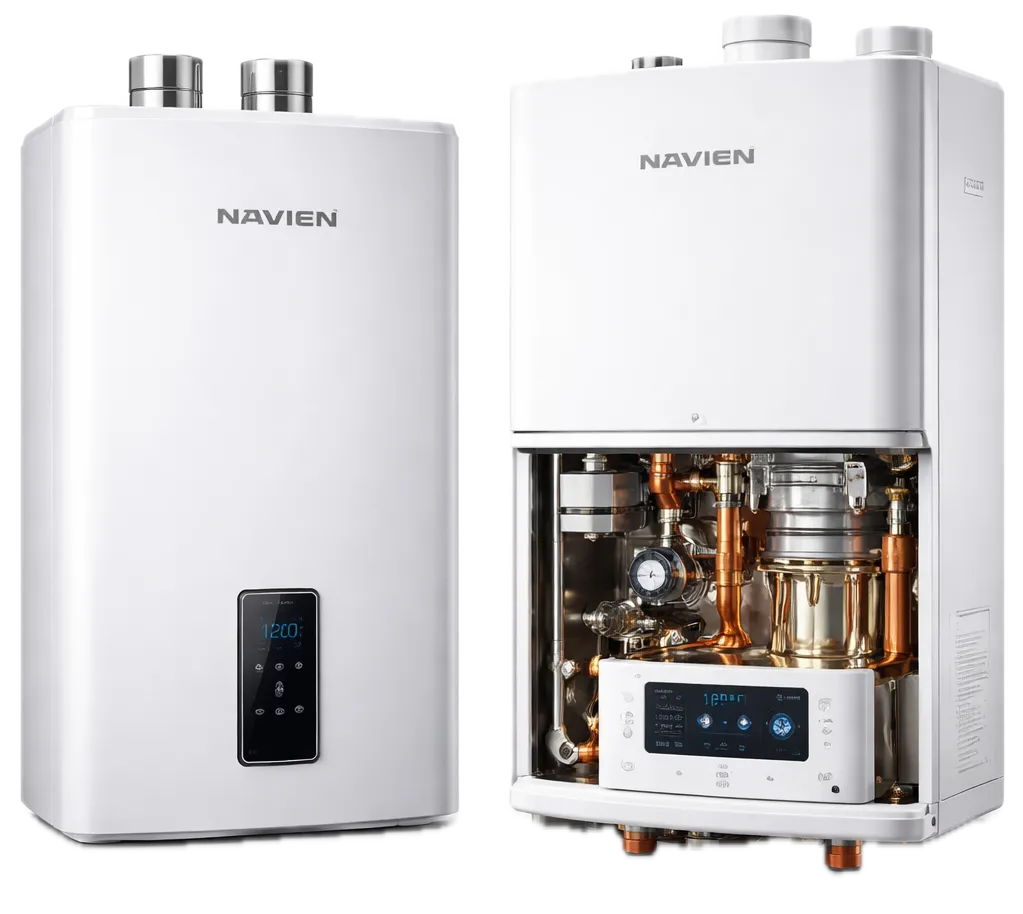
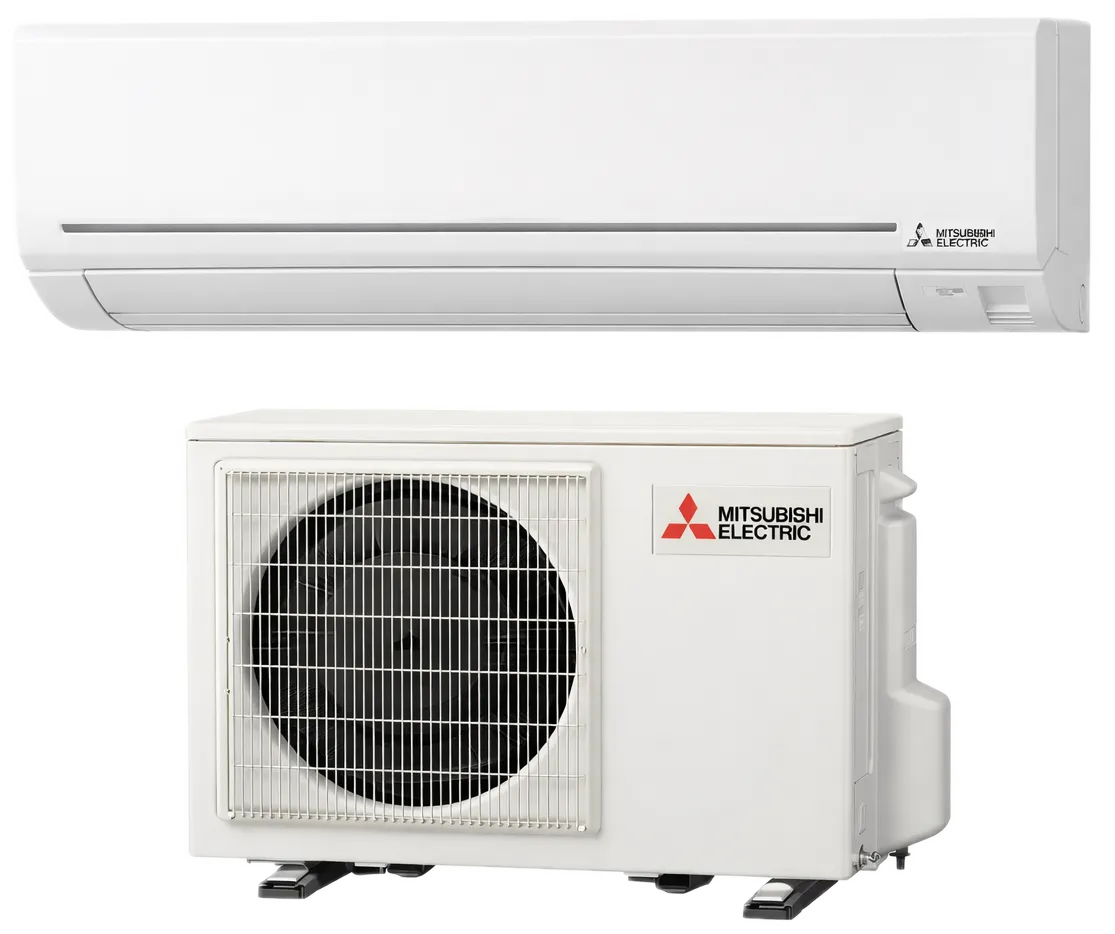
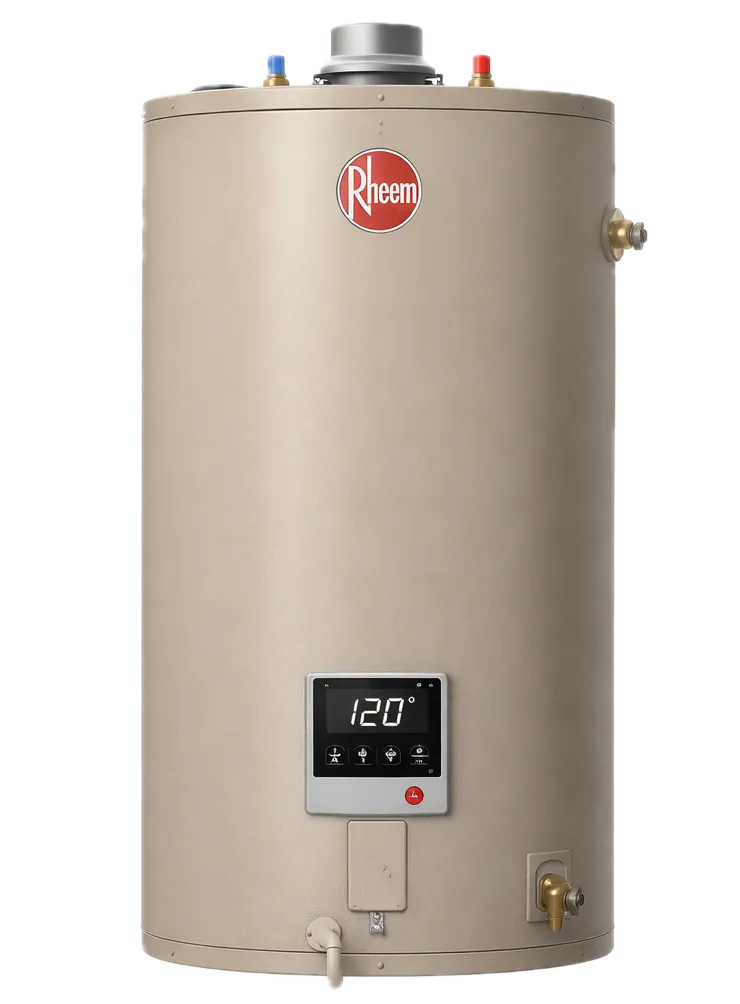



.avif)

